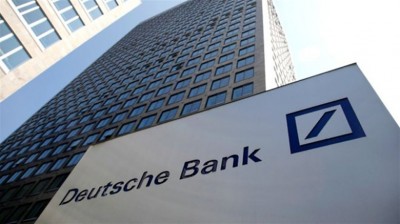Is Deutsche Bank the Next ‘Lehman Brothers’?

Europe’s biggest investment bank, Deutsche bank, is in big trouble. This Sunday it will announce a major restructuring. It’s also a harbinger of a bigger problem with European banks in general, which are loaded with trillions of euros in non-performing bank loans they haven’t been able to shed since the crisis of 2008-10 (and subsequent Eurozone double dip recession of 2011-13).
Deutsche, the biggest, is among the worst shape, much like the largest Italian banks. Deutsche soon will announce this Sunday, according to reports, a 20,000 cut in jobs, as well as asset sales of entire divisions, as it pulls out of the US and other economies and consolidates back to Germany. (It formerly tried to challenge US investment bank giants, Goldman Sachs and Morgan Stanley, by acquiring the large US bank, Bankers Trust, several years ago but has now clearly lost out in that competition and is trying merely to survive.)
But even before the next financial crisis hits Europe, which is coming soon, Deutsche is already in the process of being ‘bailed out’. One means of bail out is forcing a merger with another large bank. That was recently attempted by the German government, with German Commerz bank, but the effort failed. Another bailout measure is to get the bank in trouble to raise capital by selling off its best assets. Now firesales of its better assets are underway. Another approach is to set up what’s called a ‘bad bank’ in which to dump its non-performing assets. That’s going on with Italian banks. But those solutions may not be enough should the bank’s stock price collapse further even more rapidly. At only $7 a share now, speculators could soon jump in and drive it to near zero, as what happened in the month preceding Lehman’s collapse.
Like Lehman in 2008, another major problem with Deutsche is the composition of its risky asset portfolio of derivatives contracts undertaken in recent years and the potential for it to precipitate a global ‘contagion effect’ should its financial condition worsen rapidly.
Deutsche currently holds $45 trillion in derivative trades with other institutions. And some sources and analysts are beginning to compare it with the Lehman Brothers investment bank collapse in 2008 in the US. Like Lehman, the derivatives connection is the historic channel through which contagion and asset value collapse is transmitted across other financial institutions, leading in turn to a general credit freeze across multiple financial markets in Europe. The giant US insurance company/shadow bank, AIG, over-issued and held trillions of Lehman derivatives which it could not pay when Lehman collapsed. Deutsche may thus represent a kind of Lehman-AIG in a single institution.
Whether the European Central Bank, ECB, could successfully bail out Deutsche in the event of a crash is another related question. Unlike in 2008, the ECB is no longer in as strong a position to do so. Its policies since 2015, of QE and driving down government interest rates to negative levels, may mean a Deutsche bailout could intensify a European crisis. An ECB bailout might inject even more liquidity into the European banking system, driving interest rates significantly further into negative territory. Negative interest rates already range from 64% to 69% of all government bonds in Europe.
A recent reader of this blog raised a series of questions about Deutsche as a repeat of Lehman and asked my response. The following are his questions, and my replies:
Reader’s Question:
The largest bank in Germany is Deutsche Bank,and it is also the largest bank in the EU. Its stock has been plummeting. It laid off 20,000 employees, and I noticed that its PE ratio is 600 to 1, which means it is earning about 10 cents per share. It seems like it is getting close to being a zombie bank. The bank, however, has 45 trillion dollars in derivatives, and these appear to be heavily interconnected to U.S. banks. Can a bank be too big to fail and too big to save? If it goes under, is there a chance of contagion? Can a bank collapse and yet leave its $45 trillion in derivatives unaffected? On a scale of 1 to 10, what are the chances of a Lehman collapse and global contagion with Deutsche Bank in your view
My Reply:
The percentage potential for collapse is probably around 7 out of 10 should the next recession hit Europe. It also depends of course on which institutions are counter parties to the $45 trillion. That’s unfortunately not knowable because of the opacity of derivatives contracts (except for rate swaps). And it also depends on how financially fragile other institutions are, apart from the Deutsche-derivatives connection. My view is that European banks and financial institutions are quite fragile–given the trillions in non performing loans, negative rates, etc. Along with certain emerging market economies’ sovereign debt (and dollarized corporate debt) loads (Argentina, Turkey, etc.), India’s shadow banks leverage and NPLs, and China’s debt, Europe banks may prove the next locus of the global financial crisis on the agenda. That more general financial fragility (and thus instability) would certainly raise the probability of Deutschebank repeating the role of Lehman in the next crisis. In short, you can’t evaluate Deutschebank just in relation to its (and its counterparties) derivatives exposure. Contagion will not occur just within a certain subset of the banking system; it will soon spread via expectations to other sectors of the credit system (as it did in 2008), and that will quickly feedback negatively on the Deutschebank-partners derivatives exposure condition.
*
Note to readers: please click the share buttons above or below. Forward this article to your email lists. Crosspost on your blog site, internet forums. etc.

